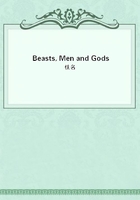
第51章 ON A VOLCANO(3)
Our troubles had vanished but we decided to start immediately to Muren Kure, as we had gathered our information and were in a hurry to make our report. We started. On the road we overtook three Cossacks who were going out to bring back the colonists who were fleeing to the south. We joined them and, dismounting, we all led our horses over the ice. The Yaga was mad. The subterranean forces produced underneath the ice great heaving waves which with a swirling roar threw up and tore loose great sections of ice, breaking them into small blocks and sucking them under the unbroken downstream field. Cracks ran like snakes over the surface in different directions. One of the Cossacks fell into one of these but we had just time to save him. He was forced by his ducking in such extreme cold to turn back to Khathyl. Our horses slipped about and fell several times. Men and animals felt the presence of death which hovered over them and momentarily threatened them with destruction. At last we made the farther bank and continued southward down the valley, glad to have left the geological and figurative volcanoes behind us. Ten miles farther on we came up with the first party of refugees. They had spread a big tent and made a fire inside, filling it with warmth and smoke. Their camp was made beside the establishment of a large Chinese trading house, where the owners refused to let the colonists come into their amply spacious buildings, even though there were children, women and invalids among the refugees. We spent but half an hour here. The road as we continued was easy, save in places where the snow lay deep. We crossed the fairly high divide between the Egingol and Muren. Near the pass one very unexpected event occurred to us. We crossed the mouth of a fairly wide valley whose upper end was covered with a dense wood. Near this wood we noticed two horsemen, evidently watching us. Their manner of sitting in their saddles and the character of their horses told us that they were not Mongols. We began shouting and waving to them; but they did not answer. Out of the wood emerged a third and stopped to look at us.
We decided to interview them and, whipping up our horses, galloped toward them. When we were about one thousand yards from them, they slipped from their saddles and opened on us with a running fire.
Fortunately we rode a little apart and thus made a poor target for them. We jumped off our horses, dropped prone on the ground and prepared to fight. However, we did not fire because we thought it might be a mistake on their part, thinking that we were Reds. They shortly made off. Their shots from the European rifles had given us further proof that they were not Mongols. We waited until they had disappeared into the woods and then went forward to investigate their tracks, which we found were those of shod horses, clearly corroborating the earlier evidence that they were not Mongols. Who could they have been? We never found out; yet what a different relationship they might have borne to our lives, had their shots been true!
After we had passed over the divide, we met the Russian colonist D.
A. Teternikoff from Muren Kure, who invited us to stay in his house and promised to secure camels for us from the Lamas. The cold was intense and heightened by a piercing wind. During the day we froze to the bone but at night thawed and warmed up nicely by our tent stove. After two days we entered the valley of Muren and from afar made out the square of the Kure with its Chinese roofs and large red temples. Nearby was a second square, the Chinese and Russian settlement. Two hours more brought us to the house of our hospitable companion and his attractive young wife who feasted us with a wonderful luncheon of tasty dishes. We spent five days at Muren waiting for the camels to be engaged. During this time many refugees arrived from Khathyl because Colonel Kazagrandi was gradually falling back upon the town. Among others there were two Colonels, Plavako and Maklakoff, who had caused the disruption of the Kazagrandi force. No sooner had the refugees appeared in Muren Kure than the Mongolian officials announced that the Chinese authorities had ordered them to drive out all Russian refugees.
"Where can we go now in winter with women and children and no homes of our own?" asked the distraught refugees.
"That is of no moment to us," answered the Mongolian officials.
"The Chinese authorities are angry and have ordered us to drive you away. We cannot help you at all."The refugees had to leave Muren Kure and so erected their tents in the open not far away. Plavako and Maklakoff bought horses and started out for Van Kure. Long afterwards I learned that both had been killed by the Chinese along the road.
We secured three camels and started out with a large group of Chinese merchants and Russian refugees to make Uliassutai, preserving the warmest recollections of our courteous hosts, T. V.
and D. A. Teternikoff. For the trip we had to pay for our camels the very high price of 33 lan of the silver bullion which had been supplied us by an American firm in Uliassutai, the equivalent roughly of 2.7 pounds of the white metal.